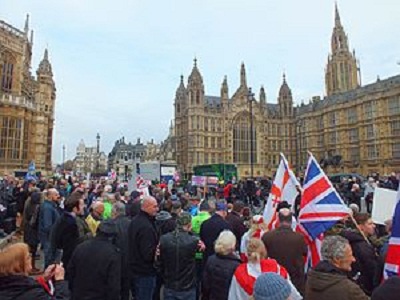"When the UK exits the EU, it will forfeit access to the Pan-Euro-Med (PEM) cumulation zone. Cumulation of origin is one of the ways to allow greater flexibility when it comes to using raw and semi-manufactured materials in the production process. It allows a member of a trade agreement to use originating products from other members. While in the EU, the UK has access to Europe’s cumulation zone known as the Pan–Euro–Med (PEM) zone."

When the UK exits the EU, it will forfeit access to the Pan-Euro-Med (PEM) cumulation zone. Cumulation of origin is one of the ways to allow greater flexibility when it comes to using raw and semi-manufactured materials in the production process. It allows a member of a trade agreement to use originating products from other members. While in the EU, the UK has access to Europe’s cumulation zone known as the Pan–Euro–Med (PEM) zone.
The PEM zone currently comprises the EU, the EFTA States (Switzerland, Norway, Iceland and Liechtenstein), Albania, Algeria, Bosnia and Herzegovina, Egypt, the Faroe Islands, Israel, Jordan, Kosovo, Lebanon, the former Yugoslav Republic of Macedonia, Montenegro, Morocco, Palestine, Serbia, Syria, Tunisia and Turkey (and partially Andorra and San Marino). It is based on trade agreements (FTAs, customs unions, etc.) with identical rules of origin signed between members.

The PEM Convention allows cumulation of originating materials between different countries within the zone. In some cases, the operations conferring origin of non-originating materials can take place across the entire cumulation zone. The latter, referred to as full cumulation, in the context of the PEM zone operates within the European Economic Area (EEA) and between the EU and Algeria, Morocco and Tunisia.
Significance of PEM
Leaving the PEM zone will impact all UK industries currently taking advantage of this arrangement. Under the PEM Convention, most clothing goods are subject to a double transformation rule. The double transformation rule of origin means that at least two substantial stages of production are needed to confer origin: in order for an item of clothing to obtain preferential origin, the weaving of fabric from yarn and the cutting and sewing of a garment from fabric would need to take place within the PEM zone.
For example, coats made in Morocco from both EU and Turkish fabrics can be exported to countries within the PEM zone. If Turkey and Morocco were not members of the PEM zone, Turkish inputs would be considered non-originating and the coats would not be eligible for a preferential tariff when re-exported to the EU (or vice versa to Turkey) according to the double transformation rule of origin.
Under full cumulation, qualifying processing does not need to occur within the territory of one single country. The different stages of production carried out across the cumulation zone can count towards the common origin of non-originating materials. For example, if non-originating yarn woven into fabrics in the EU is exported to Tunisia to be cut and sewn into suits, the final product is considered as originating in Tunisia. However, as full cumulation is not currently possible across the entire zone, the finished suits can only be exported under preference to the EU, Algeria and Morocco.
The PEM rules of origin favour local T/C companies. As the fabric used to manufacture goods cannot be imported from outside the zone, there is an incentive to retain most parts of the production chain within the zone. At the same time, the PEM zone can offer a number of benefits to T/C companies that face strong competition from exports from developing countries.
Access to raw materials such as cotton and flax, as well as to synthetic fibres, is essential to maintaining competitiveness. Price increases can also affect textile & clothing companies. For example, when India banned exports of cotton in 2010 and 2012, it caused price speculation in the market. Access to firms specialising in certain processes, such as dying in Tunisia or the spinning of fibres in Turkey, can be of equal importance. Finally, the relatively low labour costs in North African or Eastern European countries, such as Bulgaria and Romania, allow for the labour-intensive stages of production to take place there.
Impact on EU-UK FTA
The UK will lose access to the PEM cumulation zone once it leaves EU. Even if the EU-UK FTA is negotiated and in force before this occurs, the UK would also need to have agreements in place with PEM countries in order to benefit from access to the cumulation zone. Currently, UK producers can use originating materials from all PEM countries with which the UK has a bilateral agreement without losing the originating status. The final good, provided it fulfils PEM rules of origin, can be supplied/exported to all qualifying PEM countries. Under full cumulation, non-originating products can also be used since the processes undertaken in different countries can be counted towards originating status.
If the UK negotiates an FTA with the EU with separate rules of origin, the products manufactured in the UK would still need to comply with these rules to gain access to the EU markets. However, if, following the signing of such an FTA, the UK negotiates a similar agreement with any other PEM country, cumulation of origin between these two agreements would not be possible without renegotiating the EU–UK FTA rules of origin protocol.
The UK needs to decide between negotiating its own rules of origin with the EU on one hand and retaining the PEM rules on the other. It does not necessarily mean that the UK will be able to negotiate more flexible and less restrictive rules of origin than those of the PEM zone. The latter would allow for the expansion of bilateral cumulation under the EU–UK agreement to other countries within the PEM zone in the future.












